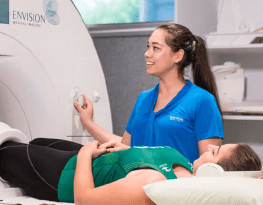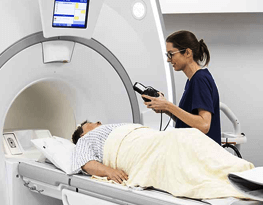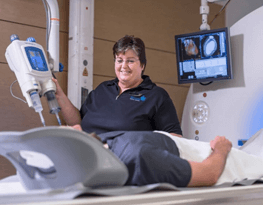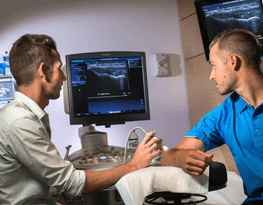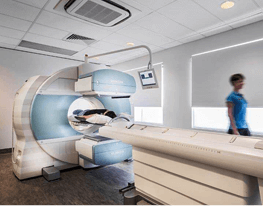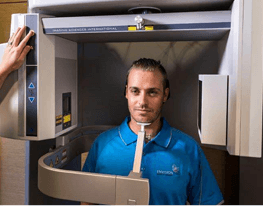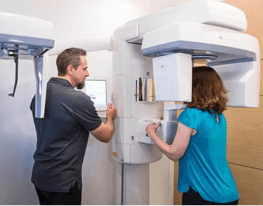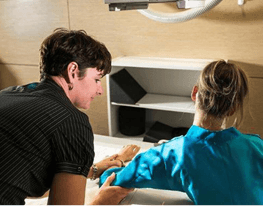What is a PSMA PET-CT Scan?
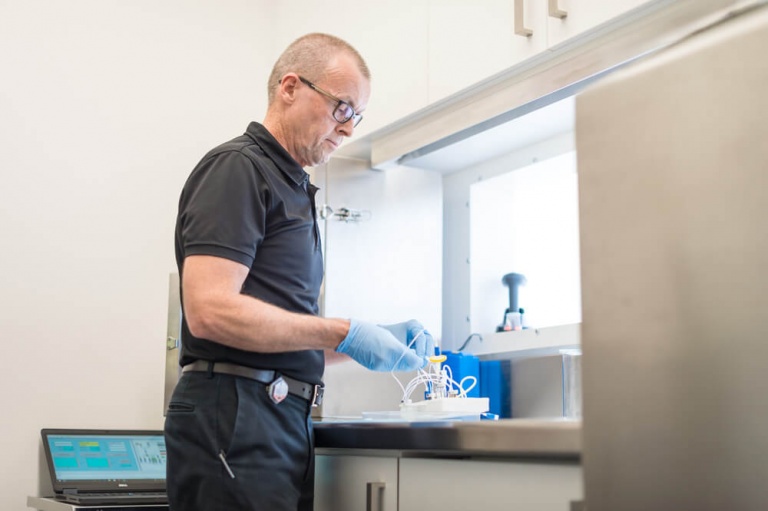
PSMA stands for Prostate Specific Membrane Antigen. The PSMA PET-CT scan is used to stage prostate cancer in patients who have had a positive prostate biopsy and in patients who have had their prostate removed but now present with increasing levels of PSA (a prostate activity marker) in their blood indicating that their cancer may have recurred.
The PSMA is a peptide (a very small protein) that is expressed on the surface of prostate cancer cells. In a PSMA PET-CT scan, a molecule that specifically binds to this peptide is linked to a radioactive isotope known as Gallium 68. When this compound is injected it will bind to any cells in the body which express PSMA on their surface.
By this method, both primary and recurrent prostate cancer can be accurately located and staged allowing for more targeted therapy.
PSMA PET-CT Scan
What happens during a PSMA PET-CT Scan?
A. Before your scan
What to bring
- Any relevant previous imaging
- Your Medicare card
To help us get an optimal PSMA PET-CT Scan, it is important that you read the following instructions prior to your appointment.
Preparation – On the day of the scan
YOU MUST FAST FOR AT LEAST 2 HOURS PRIOR TO YOUR PSMA PET-CT Scan
Drink at least 1 litre of water prior to your PET-CT appointment.
Medications
Take all medications as normal. Use only water to take medications.
What to wear
Avoid wearing jewelry and wear warm comfortable clothing without metallic zippers, buttons or labels. If you don’t have access to clothing without metal zippers etc, a gown will be provided.
Appointment duration
A PSMA PET-CT scan will take approximately 2 hours from the time you arrive till completion. For the majority of that time you will be relaxing in a comfortable room while the radioactive tracer accumulates in the body. The PSMA PET-CT scan itself will take up to 30 minutes.
B. During your PSMA PET-CT Scan
Upon arrival, you will be asked to fill in a questionnaire and consent form prior to being escorted to the PET-CT department. You will then have your weight and height measured before a brief interview with a nuclear medicine technologist. The technologist will then escort you to one of our uptake rooms. This room is a small area which contains a comfortable chair where the technologist will insert a cannula (a small tube) into a vein in your arm. This tubing will be used to administer the PSMA injection.
Don’t expect to feel anything from the injection, as the PSMA causes no side effects. Once the injection has been given, you will be left to relax for 60 minutes prior to being taken through for your PSMA PET-CT scan. During this “uptake” period you may read or use electronic devices while you wait.
After the uptake period, you will be asked to empty your bladder prior to being escorted into the PET-CT scanner room and positioned on the scanner bed. A low dose CT scan is acquired first. This involves two planning or scout x-rays which are acquired so that the technologist can accurately plan which area of the body will be covered by the PSMA PET-CT scan. The low dose CT is then acquired. This takes approximately one minute to complete and then the scanner bed will move into position for the PET part of the scan. This takes longer to acquire than the CT and will typically take 30 minutes.
Once the PSMA PET-CT scan is finished you may also have a diagnostic CT performed but this will depend on what your specialist has requested.
Once finished you are required to wait for about 15 minutes so that your images can be checked for diagnostic quality. Occasionally extra imaging will be required and this may extend the appointment time for up to an hour.
Risks and side effects
Nuclear medicine examinations including PET-CT are considered safe with almost no reported adverse reactions attributable to the radiopharmaceuticals used in these examinations.
PET-CT scans expose the patient to gamma radiation that is injected (the radioactive tracer) as well as x-rays which are generated by the CT scan component of the test. The level of radiation exposure from a PET-CT scan is minimal and Envision Medical Imaging has invested in the latest technology and employs professionals trained in radiation reduction techniques so that any radiation exposure is kept as low as possible.
It is not uncommon for a diagnostic CT scan to be performed at the same appointment as the PET-CT scan. Diagnostic CT is usually performed after the injection of a contrast agent which contains iodine. When a CT or an x-ray of the body is performed many areas appear as a similar shade of gray. Contrast agents are used to highlight blood flow, lymph nodes and organs.
There is a small risk of an allergic reaction from contrast agents and you will be asked to fill in a questionnaire to determine any potential risk prior to the test. In the unlikely event that you have a reaction to contrast Envision staff are trained in emergency procedures and have all the necessary equipment and medications to deal with any problems.
If you are worried or concerned about the test or the radiation exposure involved please speak with the nuclear medicine technologist when you go through for your appointment.
Who will perform my scan?
At Envision Medical Imaging, your PET-CT scan will be performed by a Nuclear Medicine Technologist, who has a degree in Medical Imaging, is accredited with the Australian Health Practitioner Regulation Agency (AHPRA) and holds a specialised license to practice Nuclear Medicine and CT from the Radiation Council of Western Australia.
PSMA PET-CT Scan
What happens after a PSMA PET-CT Scan?
How do I get my results?
Immediately after the PSMA PET-CT scan you may be asked to wait until your images are checked for diagnostic quality. Occasionally additional images will be required but this will be decided by the reporting radiologist when the initial images are reviewed.
If you have moved during the scan you may be asked to stay until an additional image of the affected body part can be taken. If the scanned is deemed to be of good quality you may then leave the department and resume your daily activities. There are no residual effects from the tracer or the scan.
Your images will be reviewed along with your relevant medical history, and any other imaging, and be reported on by our Nuclear Medicine Radiologist.
If your results are needed urgently, or you have an appointment straight after your scan with you referring doctor or health care provider, Envision Medical Imaging will arrange to have your results available immediately. Otherwise your referring doctor will receive your report within 48 hours of your examination. Please ensure that you make a follow up appointment with your referring doctor to discuss the results.
Post procedural information
After your scan you will be able to return to your normal daily activities.
How do I get my results?
Immediately after the PSMA PET-CT scan you may be asked to wait until your images are checked for diagnostic quality. Occasionally additional images will be required but this will be decided by the reporting radiologist when the initial images are reviewed.
If you have moved during the scan you may be asked to stay until an additional image of the affected body part can be taken. If the scanned is deemed to be of good quality you may then leave the department and resume your daily activities. There are no residual effects from the tracer or the scan.
Your images will be reviewed along with your relevant medical history, and any other imaging, and be reported on by our Nuclear Medicine Radiologist.
If your results are needed urgently, or you have an appointment straight after your scan with you referring doctor or health care provider, Envision Medical Imaging will arrange to have your results available immediately. Otherwise your referring doctor will receive your report within 48 hours of your examination. Please ensure that you make a follow up appointment with your referring doctor to discuss the results.
Post procedural information
After your scan you will be able to return to your normal daily activities.
PSMA PET-CT Scan
Download an Information and Consent Form
Medical Imaging Practice Perth
Types of Imaging
At Envision, we offer the most sought-after types of imaging for diagnostics and treatments. Our Wembley headquarters is the largest single-site radiology practice in Perth
